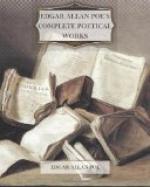Dreadfully staring
Through muddy impurity,
As when with the daring
Last look of despairing
Fixed on futurity.
Perishing gloomily,
Spurred by contumely,
Cold inhumanity,
Burning insanity,
Into her rest,—
Cross her hands humbly,
As if praying dumbly,
Over her breast!
Owning her weakness,
Her evil behavior,
And leaving, with meekness,
Her sins to her Saviour!
The vigor of this poem is no less remarkable than its pathos. The versification, although carrying the fanciful to the very verge of the fantastic, is nevertheless admirably adapted to the wild insanity which is the thesis of the poem.
Among the minor poems of Lord Byron is one which has never received from the critics the praise which it undoubtedly deserves:
Though the day of my destiny’s over,
And the star of my fate hath
declined,
Thy soft heart refused to discover
The faults which so many could
find;
Though thy soul with my grief was acquainted,
It shrunk not to share it
with me,
And the love which my spirit hath painted
It never hath found but in
thee.
Then when nature around me is smiling,
The last smile which answers
to mine,
I do not believe it beguiling,
Because it reminds me of thine;
And when winds are at war with the ocean,
As the breasts I believed
in with me,
If their billows excite an emotion,
It is that they bear me from
thee.
Though the rock of my last hope is shivered,
And its fragments are sunk
in the wave,
Though I feel that my soul is delivered
To pain—it shall
not be its slave.
There is many a pang to pursue me:
They may crush, but they shall
not contemn—
They may torture, but shall not subdue
me—
’Tis of thee
that I think—not of them.
Though human, thou didst not deceive me,
Though woman, thou didst not
forsake,
Though loved, thou forborest to grieve
me,
Though slandered, thou never
couldst shake,—
Though trusted, thou didst not disclaim
me,
Though parted, it was not
to fly,
Though watchful, ’twas not to defame
me,
Nor mute, that the world might
belie.
Yet I blame not the world, nor despise
it,
Nor the war of the many with
one—
If my soul was not fitted to prize it,
’Twas folly not sooner
to shun:
And if dearly that error hath cost me,
And more than I once could
foresee,
I have found that whatever it lost me,
It could not deprive me of
thee.
From the wreck of the past, which hath
perished,
Thus much I at least may recall,
It hath taught me that which I most cherished
Deserved to be dearest of
all:
In the desert a fountain is springing,
In the wide waste there still
is a tree,
And a bird in the solitude singing,
Which speaks to my spirit
of thee.




